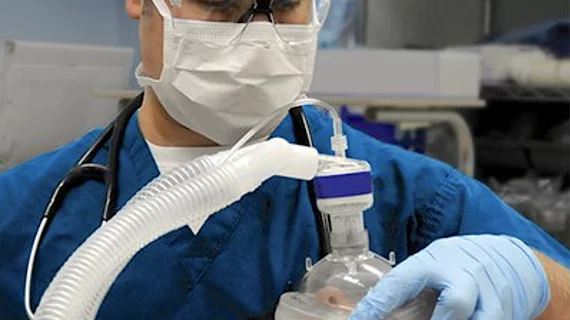Michigan opts out of federal physician supervision of nurse anesthetists
Michigan has become the 20th state to opt out from federal regulations that require physician supervision of certified registered nurse anesthetists (CRNAs). The move was made to ensure access to value-based, high-quality care across the state, but it is being opposed by the Michigan Society of Anesthesiologists (MSA) and several other physician groups.
MSA is urging Governor Gretchen Whitmer to maintain Michigan’s adherence to the federal requirement for physician supervision of nurse anesthetists. MSA said opting out of the Centers for Medicare and Medicaid Services (CMS) physician supervision requirement would dismantle the anesthesia care team model in Michigan by allowing nurse anesthetists to administer anesthesia without physician supervision.
More than 950 MSA member physicians sent letters to Whitmer this week urging her not to opt out. They joined the Michigan Board of Medicine, Michigan State Medical Society, Michigan College of Emergency Medicine and Michigan Radiology Society in opposing the move.
“An exemption to the federal regulation is simply the wrong choice for patients and is clearly not what the people of Michigan want for their health care,” said MSA President Neeju Ravikant, MD, said in a statement. “Removing physician supervision from anesthesia care threatens patient safety, raises healthcare costs and lowers the quality of health care at a time when families are struggling across Michigan. Employers such as hospitals and surgery centers would see larger bottom lines while Michigan patients pay the price.”
A March 2021 survey found 66% of Michigan voters oppose removing physician supervision of nurse anesthetists when administering anesthesia to patients in the operating room, according to the MSA.
Michigan law requires physician supervision of all nurse anesthetists unless they have practiced for at least three years and have at least 4,000 hours. Even then, those nurse anesthetists must collaboratively participate in a patient-centered care team where the physician is immediately available.
For all these reasons, MSA said an opt out is not appropriate. Based on feedback from more than 1,000 anesthesiologist members, the MSA believes this move will "demoralize the physician community and decimate the ability to recruit and retain talent," the MSA said in a statement.
However, the move was seen as a benefit to patients by the the American Association of Nurse Anesthesiology (AANA). The AANA said the governors of 19 additional states and Guam have exercised such exemptions.
In March 2020, to maximize healthcare resources during the outbreak of the COVID-19 pandemic, Gov. Whitmer enacted an executive order removing physician supervision for CRNAs. In July 2021, Gov. Whitmer signed HB4359 to remove supervision requirements for CRNAs in the state nurse practice act, making the temporary COVID-era order permanent
"Removing barriers to CRNA practice allows Michigan hospitals to select the anesthesia delivery model that maximizes their workforce and increases access to safe, affordable care for all patients," said Toni Schmittling, DNAP, MBA, CRNA, former president of the Michigan Association of Nurse Anesthetists (MANA) in a statement. "By signing this important legislation, Michigan recognizes that CRNAs are qualified to make decisions regarding all aspects of anesthesia care based on their education, licensure, and certification."
AANA said anesthesia services are provided predominantly by CRNAs in Michigan's critical access hospitals, which offer offering surgical services in 99% of its rural hospitals. They comprise 68% of the state's anesthesia care providers.
"The AANA applauds Gov. Whitmer for recognizing the important role CRNAs have in delivery of safe anesthesia care in Michigan," AANA President Dina Velocci, DNP, CRNA, APRN, said in a statement. "Increased demand, limited resources, and a state with diverse populations, both rural and urban, dictate that a system capable of meeting the needs of all Michigan residents be maintained. By signing the opt-out letter, this has been achieved."
The AANA said throughout the COVID-19 pandemic, nurse anesthetists across the country have, in addition to providing top-of-the-line anesthesia care, served as experts in airway management, hemodynamic monitoring, management of patients on ventilators, and overall management of critically ill patients.
Similar bill in Wisconsin vetoed that would have reduced physician oversight of advanced practice registered nurses
Wisconsin Governor Tony Evers vetoed a similar measure in April. That bill also would have eliminated some requirements for physician collaboration with all advanced practice registered nurses (APRNs), including nurse anesthetists.
“This bill would have confused the roles of physicians and nurses and actively dismantled the care team model that makes Wisconsin a leader in patient care by allowing nurse anesthetists with far less education and training than physicians to provide anesthesia care and pain management without physician oversight,” explained American Society of Anesthesiology (ASA) President Randall M. Clark, MD, FASA in a statement.
The ASA said Evers vetoed the measure because he opposes altering current licensure standards for APRNs, allowing practices functionally equivalent to those of physicians or potentially omitting physicians from a patient’s care altogether. Read more on his veto in a letter to the Wisconsin Senate.

